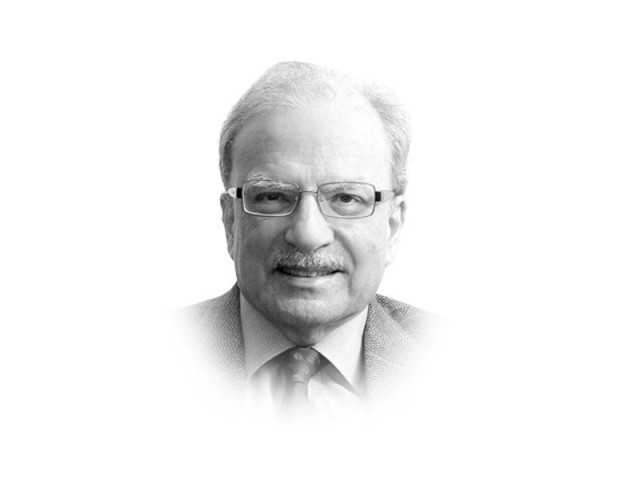Trump at the UN
The world is watching, wondering where Donald Trump is headed

The writer is a former caretaker finance minister and served as vice-president at the World Bank
The first address in which the new structure began to be built was on January 20 in Washington when Trump took the oath of office. In the inaugural speech, the new president made it clear that “America First” would be the basis on which he and his administration would deal with the world. The second speech was given in May in Riyadh when he pledged an all-out war against international terrorism, singling out Iran and Qatar for lending support to dissident forces. The third came in July in Warsaw in which Trump divided the world into two country-clusters, the West and the Rest. He challenged the West to show the will to keep the Rest — and by that he meant mostly the world of radical Islam — at bay.
The United Nations address on September 17 closed the circle by laying out the basis on which the new Trumpian world was to be constructed, replacing the one that was no longer relevant — if it ever was — for what was required to manage the often unruly world. That order was structured over time; the first few bricks were laid down at Bretton Woods in 1944. Then the war in Europe had ended with Germany and Italy defeated by the allied powers led by the United States. The Asian war was still being fought as Japan, in spite of suffering heavy losses, had stubbornly refused to surrender. Surrender came after the devastating nuclear attacks on the cities of Hiroshima and Nagasaki. More bricks were added later, in particular in the area of international trade. President Trump had made the world aware of his impatience with the old world order during the long and bitterly fought campaign for the US presidency. It did not seem to concern him that he was alone among the leaders of world’s major powers in wanting to build a new system structured on the goals pursued by individual countries, not on the collective global interest.

In the UN speech, Trump used the word “sovereignty” 21 times, saying that strong sovereign nations should keep their citizens safe while enabling them to prosper economically. It was this belief that had led him to use the term “America First” in his inaugural address delivered on the steps of the US Capitol, eight months earlier. At the UN, he said strong sovereign nations could join together to fight common threats and constitute the irreducible blocks of global institutions such as the United Nations. In the election campaign for the US presidency, Trump had repeatedly expressed his doubt whether the United Nations system served any purpose. In the New York speech, he did not make that suggestion but maintained that the United States should not be required to shoulder a good part of the financial burden of carrying and running the UN system. “As president of the United States, I will always put America first,” he told his audience of heads of state.
The emphasis on sovereignty has a long history in the West. It goes back to Roman times. It was elaborated in agreements like the Peace of Westphalia that gave rise to the principle of noninterference in a country’s internal affairs. It was the foundation on which the victors of the Second World War erected the UN system. But some critics found Trump’s definition narrow and selfish. “It looks like we will respect the sovereignty of countries we like, whether they are dictatorship or democracies, but we will not respect the sovereignty of countries we don’t like,” said Vali R Nasr, an Iranian-American who is now the dean of the Johns Hopkins School of Advanced International Studies. “His definition of sovereignty comes from a very narrow domestic prism,” continued Nasr. It did not preclude criticism of the countries and their leaders who did not fit into the Trumpian view of the world. Two of the three countries — North Korea and Iran — named by President George W Bush as belonging to an “axis of evil” were back on the Trump list.
While Trump covered a great deal of ground in the UN speech what he said about these two countries drew the most attention. He used abuse and ridicule to get North Korea to pay attention to what he was saying. In the case of Iran — as he had done during the election campaign — the focus was on the nuclear accord as well as its alleged role in supporting international terrorism. He once again called the nuclear accord the worst deal Washington had ever concluded. The policies he is likely to pursue with these two nations will reverberate across the globe. The world is watching, wondering where Donald Trump is headed.
Published in The Express Tribune, October 3rd, 2017.
Like Opinion & Editorial on Facebook, follow @ETOpEd on Twitter to receive all updates on all our daily pieces.















COMMENTS
Comments are moderated and generally will be posted if they are on-topic and not abusive.
For more information, please see our Comments FAQ